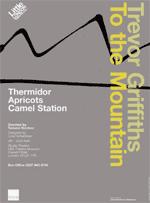To The Mountain: 'Thermidor', 'Apricots' and 'Camel Station'
A trilogy of short plays by Trevor Griffiths gets an airing at the Studio Theatre (V & A Theatre Museum in Covent Garden). Directed by Tamara Hinchco, 'Thermidor', 'Apricots' and 'Camel Station' are all two-handers with the overall title 'To The Mountain'. If anything unifies these pieces it's the concept of socio-political influences on the human condition, but the subject areas are pretty diverse, taking us from the Stalinist regime of 1930s Moscow to the 'no fly' zone of Iraq in 2001, with a brief stop along the way in English middle-class suburbia of 1971.
'Thermidor' is an unnerving and chilling piece about the communist party in the Soviet Union during the 1920s and 30s. With the communists and Stalin further entrenching their power, revolutionary zeal has been vaporised by the dominance of the 'party'. It's Moscow 1937, and Anya (played by Imogen Smith) has managed to offend the party, not through any fault of her own (she says) but simply by being connected in some vague way with others who have offended, or even betrayed the party. She's called to a preliminary interrogation, but by the time she leaves, it's clear that decisions about her fate have already been taken.
This play turned out to be enormously atmospheric. The simple set - desk and two chairs, and a picture of comrade Stalin on the wall - together with period costumes and the subdued formality of the conversation, had a realism about it which only struck me some time later. The setting reminded me of a visit to the austere cabinet war rooms in Westminster, and I suspect that location might also have provided some inspiration for designer Lone Schacksen.
At one point in the 'conversation' between Anya and her interrogator Gennadi (played by Alexander McConnell) it becomes clear that they've met before when Gennadi was a boy. For a few moments he's thrown - suddenly normal human feelings start to impinge on his authoritarian duties. His bureaucratic feathers are ruffled, and we wonder if he will 'let her off the hook'. He doesn't. And we know that he can't because his own neck would be on the block. But there's also the bigger question of how the party machine has dehumanised relationships - as Gennadi says in a matter of fact way, 'Enemies are no longer people'.
A decaying marriage is the subject of the second play 'Apricots', with Andrea Sadler as wife Anna and Daniel James as her husband, Sam. The setting is a suburban garden in 1971. It's 10pm and Anna has just put the kids to bed. Now alone, the couple's thoughts focus on their sexual relationship, but their desperate attempts at intimacy are mechanical and unfulfilling. Though they've obviously been together for some time, they are worlds apart with totally different viewpoints on romance, love and sexuality.
The problem with this play is that we really haven't enough information about the relationship to understand why or how things have gone wrong. So, we're left feeling almost as unfulfilled as they do. And I couldn't understand why they ever married in the first place, because Anna was certainly looking for rather more from the relationship than she's ever managed to obtain. But maybe that's exactly Griffiths's point.
The final piece, 'Camel Station', was written in 2001 and gets its premiere here. It's based on a joke which Griffiths was told in East Jerusalem, and thus injects some humour into the proceedings as well as some charm, largely thanks to a charismatic performance by the young actor, Fenar Mohammed-Ali. Set in Iraq, 'Camel Station' is about a shepherd boy who we discover tending flocks in the mountains of Iraq. When his cousin Suriya (played by Lisa Came) arrives to bring him some food, we learn that Tarik is about to train as a Hakawati (an Arab story teller). Encouraged by his cousin, he tells us a funny tale about Saddam of Tikrit and his encounter with a camel. In his story, Tarik transmogrifies Saddam's camel into a mechanical object which, when it 'breaks down', can be repaired at the 'camel station' (for which, read 'camel garage'). In the event, the camel is 'repaired' using an unorthodox approach (but I won't give the joke away).
Mohammed-Ali's delivery and accent captivated the audience, but Griffith's excellent use of language also provided exactly the right vehicle. Still, the ending left us with some disquiet, and provided a powerfully sobering contrast to the humour which had gone before.
Now these might not be earth-shattering plays either in terms of their mass appeal or in the messages which they're trying to convey. But they are certainly stimulating, interesting and worthy pieces. Of the three, I found 'Apricots' least satisfying because I needed to know more - with the other two pieces they left me wanting much more. But that's short plays for you: they often entice, frequently tantalise and sometimes enrage. However, all three plays are thought-provoking, and with good direction and committed performances all round, they deserve to be seen.
(Peter Brown)
Originally published on
